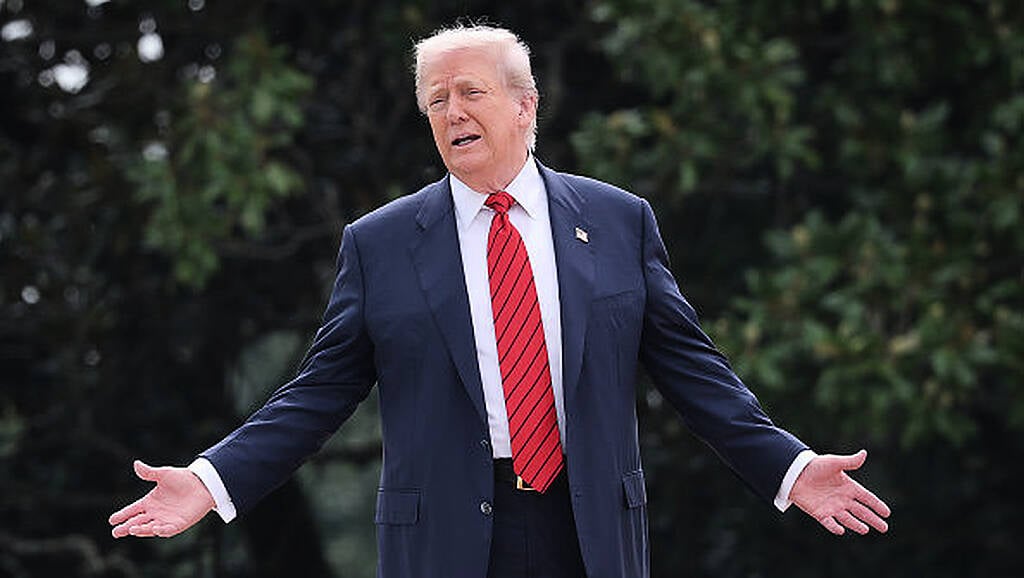Business
Trump Proposes Tariffs on Pharma Imports to Boost US Production

President Donald Trump announced plans on Tuesday to implement a “small tariff” on pharmaceutical imports to the United States, with intentions to escalate this tariff to 150 percent within 18 months, potentially rising to 250 percent thereafter. This strategy aims to increase domestic production of pharmaceuticals. In an interview with CNBC, Trump stated, “In one year, one-and-a-half years maximum, it’s going to go to 150 percent and then it’s going to go to 250 percent because we want pharmaceuticals made in our country.”
The initial tariff rate on pharmaceuticals has yet to be disclosed. Last month, Trump indicated that tariffs on pharmaceuticals could reach as high as 200 percent. In February, he mentioned that sector-specific tariffs on pharmaceuticals and semiconductor chips would commence at “25 percent or higher,” with plans for significant increases over the following year.
In addition to pharmaceuticals, Trump indicated that he intends to announce tariffs on semiconductors and chips within the “next week or so,” although details surrounding those tariffs remain unclear.
The United States is currently undertaking a national security review of the pharmaceutical sector, and companies within the industry are preparing for potential tariffs. The timeline for releasing the findings of this review has not been specified.
Several pharmaceutical companies have already committed to substantial investments in U.S. manufacturing facilities in response to Trump’s tariff threats. For instance, AstraZeneca has pledged $50 billion to expand its operations in the United States.
The Pharmaceutical Research and Manufacturers of America (PhRMA), the primary lobbying organization for the industry, has not responded to requests for comment regarding these developments.
A framework agreement between the United States and the European Union currently stipulates that tariffs on pharmaceuticals and semiconductors are set at zero. If the U.S. raises these tariffs following its import investigation, they will be capped at 15 percent.
The pharmaceutical sector is a significant contributor to Ireland’s economy, employing approximately 45,000 people and accounting for a major portion of the country’s exports to the U.S. In 2023, total Irish exports were valued at €223.8 billion, with around one-third directed to the United States. Of the €72.6 billion in U.S. imports from Ireland, roughly €58 billion pertains to pharmaceuticals and chemicals, highlighting the importance of this sector in transatlantic trade.
As the situation develops, the implications of these proposed tariffs will be closely monitored by both industry stakeholders and international partners, particularly in light of the potential economic impact on both the U.S. and Irish pharmaceutical sectors.
-

 Top Stories3 months ago
Top Stories3 months agoTributes Surge for 9-Year-Old Leon Briody After Cancer Battle
-

 Entertainment4 months ago
Entertainment4 months agoAimee Osbourne Joins Family for Emotional Tribute to Ozzy
-

 Politics4 months ago
Politics4 months agoDanny Healy-Rae Considers Complaint After Altercation with Garda
-

 Top Stories4 months ago
Top Stories4 months agoIreland Enjoys Summer Heat as Hurricane Erin Approaches Atlantic
-

 World5 months ago
World5 months agoHawaii Commemorates 80 Years Since Hiroshima Bombing with Ceremony
-

 Top Stories3 months ago
Top Stories3 months agoNewcastle West Woman Patricia Foley Found Safe After Urgent Search
-

 Top Stories5 months ago
Top Stories5 months agoFianna Fáil TDs Urgently Consider Maire Geoghegan-Quinn for Presidency
-

 World5 months ago
World5 months agoCouple Convicted of Murdering Two-Year-Old Grandson in Wales
-

 World5 months ago
World5 months agoGaza Aid Distribution Tragedy: 20 Killed Amid Ongoing Violence
-

 World5 months ago
World5 months agoAristocrat Constance Marten and Partner Convicted of Infant Murder
-

 Top Stories4 months ago
Top Stories4 months agoClimbing Errigal: A Must-Do Summer Adventure in Donegal
-

 Top Stories4 months ago
Top Stories4 months agoHike Donegal’s Errigal Mountain NOW for Unforgettable Summer Views









